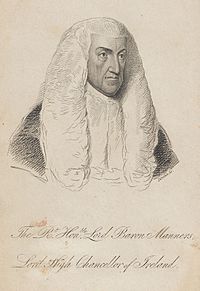Thomas Manners-Sutton, 1st Baron Manners facts for kids
Quick facts for kids
The Lord Manners
|
|
|---|---|

Lord Manners
|
|
| Lord Chancellor of Ireland | |
| In office 1807–1827 |
|
| Monarch | George III George IV |
| Prime Minister | The Duke of Portland Spencer Perceval The Earl of Liverpool |
| Preceded by | George Ponsonby |
| Succeeded by | Sir Anthony Hart |
| Personal details | |
| Born | 24 February 1756 |
| Died | May 31, 1842 (aged 86) |
| Nationality | British |
| Spouses | (1) Anne Copley (d. 1814) (2) Hon. Jane Butler |
| Alma mater | Emmanuel College, Cambridge |
Thomas Manners-Sutton, 1st Baron Manners (born February 24, 1756 – died May 31, 1842) was an important British lawyer and politician. He held a very high position called Lord Chancellor of Ireland for 20 years, from 1807 to 1827. This role meant he was the head judge and a key advisor to the government in Ireland.
Contents
Early Life and Education
Thomas Manners-Sutton was born into a well-known family. He was the sixth son of Lord George Manners-Sutton. His family had connections to the Duke of Rutland. His older brother, Charles Manners-Sutton, became the Archbishop of Canterbury, a very important religious leader in England.
Thomas went to Charterhouse School and then to Emmanuel College, Cambridge University. He studied hard and earned his first degree in 1777. After university, he studied law and became a lawyer in 1780.
Political and Legal Career
Thomas Manners-Sutton began his political journey in 1796. He was elected as a Member of Parliament (MP) for a place called Newark. He served as an MP until 1805.
From 1802 to 1805, he worked as the Solicitor-General. This is a senior legal advisor to the government. Before that, he was a legal advisor to the Prince of Wales, who later became King George IV.
In 1805, Thomas became a Baron of the Exchequer. This was a judge in a special court that dealt with financial matters. He held this position until 1807.
Lord Chancellor of Ireland
In 1807, Thomas Manners-Sutton was given a very important job. He became a member of the Privy Council, which advises the King. He was also given the title of Baron Manners, making him a Lord. Most importantly, he was appointed Lord Chancellor of Ireland.
As Lord Chancellor, he was the chief judge in Ireland and played a big role in the government. He served in this position for 20 years, until 1827.
During his time, he relied a lot on the Attorney-General for Ireland, William Saurin. This made Saurin very powerful in the Irish government.
Views on Catholic Emancipation
Lord Manners had strong beliefs about the laws of his time. He was against Catholic emancipation. This was a movement to give Roman Catholics more rights, like being able to hold public office. He even spoke against the Roman Catholic Relief Act 1829 in the House of Lords, which was a law that finally gave Catholics more rights.
Even though he had these political views, he was known as a fair judge. He treated everyone equally in his court, no matter their religion. For example, in a famous case in 1823, he made a ruling that helped Catholics in Ireland. Many Catholic lawyers, including Daniel O'Connell, respected his fairness.
Family Life
Lord Manners was married twice. His first wife was Anne Copley, whom he married in 1803. They did not have any children together. Anne passed away in 1814.
Later, he married the Honourable Jane Butler. They had one son named John Manners-Sutton.
Lord Manners passed away in May 1842 when he was 86 years old. His son, John, inherited his title and became the 2nd Baron Manners.
 | Mary Eliza Mahoney |
 | Susie King Taylor |
 | Ida Gray |
 | Eliza Ann Grier |

